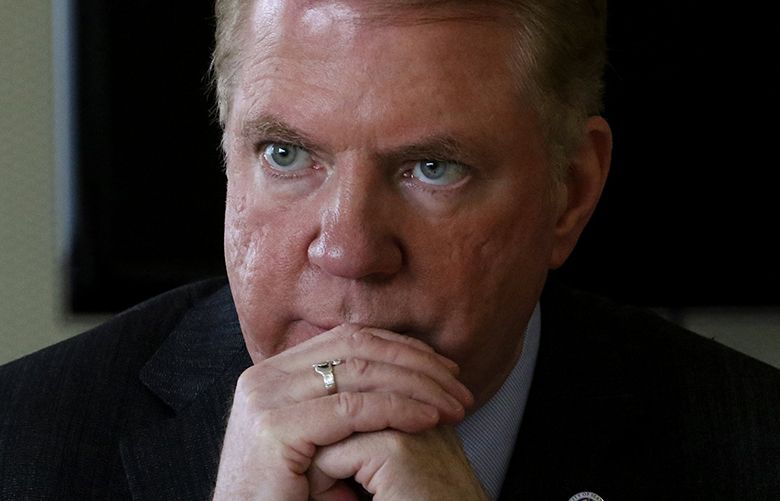Bruce Harrell has been serving as mayor since Sept. 13, when Ed Murray resigned amid growing allegations that he sexually abused multiple teenagers decades ago.
Another day, another mayor.
The Seattle City Council picked Councilmember Tim Burgess Monday to replace Council President Bruce Harrell as temporary mayor and serve for the next 71 days, until a new mayor is elected.
Sworn in shortly after the council’s 5-1 vote, Burgess became the city’s 55th mayor — and its third in less than a week. Only Councilmember Kshama Sawant voted against selecting the former radio journalist, police officer and public-relations professional.

- Seattle Mayor Ed Murray resigns after fifth child sex-abuse allegation
- Ed Murray’s exit from public life leaves Seattle feeling pain, relief
- Just as the Greeks told it: Hubris brought the mayor down | Westneat
- Bruce Harrell to take oath Wednesday as Seattle mayor
- With Ed Murray out as Seattle mayor, here’s how his duties will be handled
- Murray's cousin accuses him of child molestation
- Murray won't seek second term: 'It tears me to pieces to step away'
- Editorial: Mayor Ed Murray right to step aside
“This is a time of transition,” Burgess, 68, told colleagues and reporters before taking the oath of office in a hastily put-together City Hall ceremony. “But the people of Seattle need to know that the city government is open and functioning on their behalf.”
Most Read Local Stories
A Seattle native who previously served on the Seattle Ethics and Elections Commission, Burgess grew up on Capitol Hill and now calls Queen Anne home.
First elected in November 2007, he led a push for city-subsidized preschool, sponsored the law that put Seattle on a path to a $15-an-hour minimum wage and helped hire Police Chief Kathleen O’Toole. Supporters consider him a pragmatic progressive who’s exerted a moderating influence on an increasingly activist council.
“We are united,” Burgess said, surrounded by other city, county and state leaders, “in our desire for Seattle and our region to be a place where you can go to work and then return safely to your home, where you can raise a family, where your children can receive the best possible education, where you can start a business and watch it soar.”
Harrell was the city’s first Asian-American mayor but served only a few days, taking over Sept. 13 after Ed Murray resigned amid growing allegations that he had sexually abused teenagers decades ago.
Under the city charter, the council president becomes mayor when the position is vacant and then has five days in which to accept or decline to continue to serve.
Harrell declined the longer tenure Friday, saying he wanted to return to the council rather than serve as mayor through Nov. 28. On that date, the results of the Nov. 7 election will be certified and either Jenny Durkan or Cary Moon will take over as mayor.
Had Harrell accepted the longer tenure, he would have had to surrender his District 2 council seat with more than two years remaining in his term. Once Harrell declined, the council had to select another of its members to serve as mayor, according to the charter.
Because Burgess decided months ago to retire at the end of this year rather than seek a fourth term, he didn’t need to worry about losing his council seat.
Councilmember M. Lorena González nominated him Monday, calling him a friend and saying he would take the business of the city “incredibly seriously.”
Appointing Burgess required affirmative votes from at least five council members — a majority of the nine-member panel. Burgess recused himself, Councilmember Lisa Herbold was absent and Harrell didn’t vote because he was serving as mayor.
Councilmember Debora Juarez called Burgess “a man of integrity,” while Councilmember Sally Bagshaw said he had been “solid, steady and dependable.”
In opposing Burgess, Sawant predicted he would advance a “business-as-usual budget.” The mayor is due to propose a new city budget to the council next week.
“It’s not a personal question. It’s about what positions council members have taken in the past,” she told her colleagues, saying Burgess had sought to crack down on aggressive panhandling and supported sweeps of homeless encampments.
Though she opposed Burgess, Sawant offered no mayoral nomination of her own.
Addressing the council after his selection, Burgess referenced Murray’s scandal.
“This is certainly not the way anyone would have chosen to become mayor of our great city. It is, however, where we are,” he said. “I promise to work every day for the next 71 days as mayor to help us heal and move the city forward.”
Asked by reporters whether his proposed budget would boost city help for survivors of sexual abuse, Burgess declined to commit, saying that would be considered soon.
Burgess was not among city and community leaders who called for Murray to leave office in the spring and summer, when four men alleged abuse. After a younger cousin became Murray’s fifth accuser last week, Burgess said stepping down was right.
González was initially thought to be a potential candidate for temporary mayor. Favored to win re-election to her citywide seat Nov. 7, she could have won and then rejoined the council. But she took herself out of consideration Monday morning.
“I remain focused on championing my priorities for public safety, working families, domestic-violence and sexual-assault survivors and immigrants and refugees through the impending budget season,” she said in a statement.
The council must now appoint a temporary council member. That could happen as early as this week.
Burgess’ citywide seat, like González’s, is up for election this year, so his temporary replacement will serve only until Nov. 28.
At that point, one of the candidates for the seat — Teresa Mosqueda or Jon Grant — will take over.
Although Burgess’ immediate replacement won’t serve long, he or she will get to weigh in on the next city budget, including allocations related to homeless services.
The last time the council had a vacancy — when Sally Clark quit in 2015 to take a job at the University of Washington — it appointed veteran City Hall bureaucrat John Okamoto to temporarily replace her. Okamoto could be appointed again this year.
Another potential caretaker: former Councilmember Nick Licata, who retired at the end of 2015.
